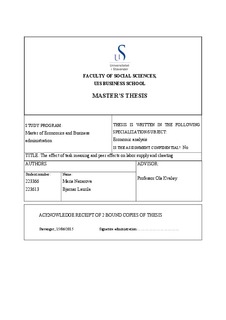| dc.contributor.author | Laurila, Bjørnar | |
| dc.contributor.author | Nazarova, Maria | |
| dc.date.accessioned | 2015-09-08T08:36:50Z | |
| dc.date.available | 2015-09-08T08:36:50Z | |
| dc.date.issued | 2015-06 | |
| dc.identifier.uri | http://hdl.handle.net/11250/299005 | |
| dc.description | Master's thesis in Economic analysis | nb_NO |
| dc.description.abstract | This thesis intends to provide the experimental evidence of the role of task meaning and peer effects on labor supply and cheating in a laboratory setting. Despite quite substantial body of research conducted on the concept of the meaning of work in different disciplines, it is still a relatively young research domain and previous literature on interconnection of task meaning and labor supply is relatively scarce.
We build on the experimental design of Ariely et al (2008) and manipulate the level of task meaning to see whether it influences individuals’ labor supply. In addition, we introduce peer sessions, similarly to Bäker and Mechtel (2014) to examine possible compensation of the negative effect of low task meaning on labor supply by the presence of peer. Similarly to Pascual-Ezama et al. (2013) we check the level of cheating in high and low task meaning conditions to see possible relations between cheating, task meaning and the perceived level of monitoring. Our modified version of Ariely et al’s experiment (2008) is aimed to check the robustness of the results from previous similar experiments and study the relation between task meaning, labor supply and cheating in Norwegian setting.
Test subjects, students at the University of Stavanger, were to do a simple repetitive task of finding ten pairs of consequent letters S in otherwise random sequence of letters and highlight them. Test subjects were randomly assigned to condition with either high (Acknowledged) or low (Crumpled) task meaning with or without peer. Total amount of sheets with a task completed served as a measure of labor supply for each individual. Cheating was measured as the number of pairs of S not found/highlighted in the task sheet, meaning that test subject submitted an incomplete task and was possibly cheating.
Contrary to Ariely et al (2002) and Bäker and Mechtel (2014), we found no significant differences in labor supply between conditions with high and low task meaning. These results are in line with Pascual-Ezama et al’s (2013) findings and question the robustness of Ariely et al’s (2008) and Bäker and Mechtel’s (2014) results. The presence of peer has not influenced labor supply significantly either. However, when it comes to cheating, presence of peer together with low task meaning gives a significantly higher level of cheating than individual conditions, regardless of the level of task meaning. | nb_NO |
| dc.description.sponsorship | Handelshøgskolen ved Universitetet i Stavanger | nb_NO |
| dc.language.iso | eng | nb_NO |
| dc.publisher | University of Stavanger, Norway | nb_NO |
| dc.relation.ispartofseries | Masteroppgave/UIS-SV-HH/2015; | |
| dc.rights | Navngivelse 3.0 Norge | * |
| dc.rights.uri | http://creativecommons.org/licenses/by/3.0/no/ | * |
| dc.subject | økonomi | nb_NO |
| dc.subject | administrasjon | nb_NO |
| dc.subject | adferdsøkonomi | nb_NO |
| dc.subject | motivasjon | nb_NO |
| dc.subject | økonomisk analyse | nb_NO |
| dc.title | The effect of task meaning and peer effects on labor supply and cheating | nb_NO |
| dc.type | Master thesis | nb_NO |
| dc.subject.nsi | VDP::Social science: 200::Economics: 210::Economics: 212 | nb_NO |
| dc.subject.nsi | VDP::Social science: 200::Economics: 210::Business: 213 | nb_NO |
| dc.source.pagenumber | 71 | nb_NO |
| dc.relation.project | Handelshøgskolen ved Universitetet i Stavanger | nb_NO |

